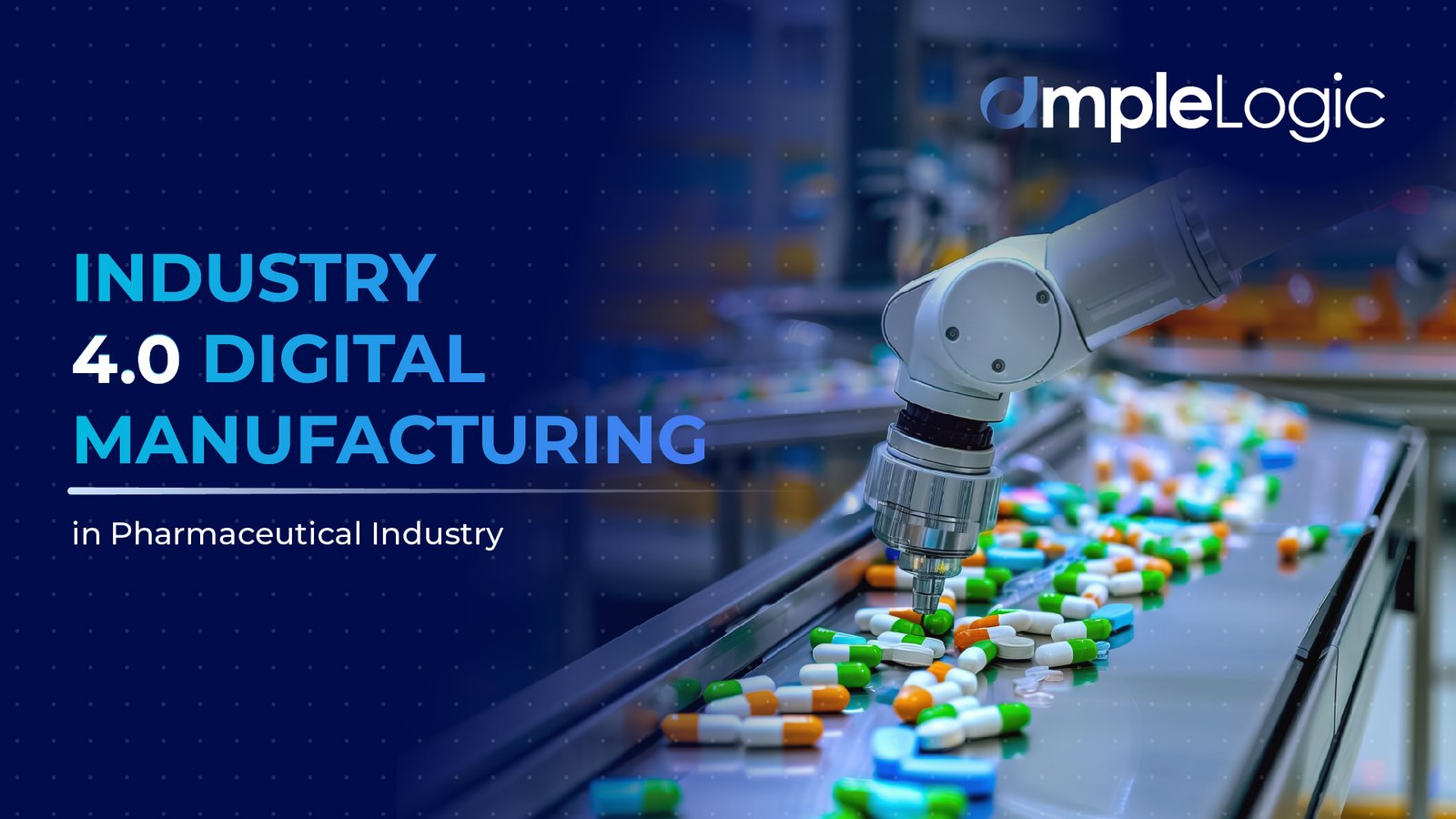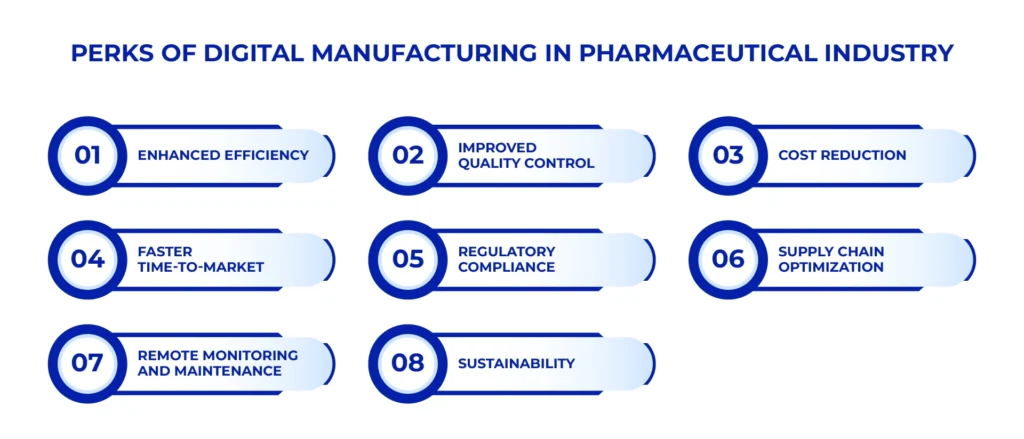
The pharmaceutical industry is experiencing unprecedented growth, with the global pharma manufacturing market expected to grow at a compound annual growth rate (CAGR) of 7.63% from 2023 to 2030. Amidst this growth, the industry faces the challenge of integrating advanced technologies into traditional business models to stay competitive. A survey by KPMG revealed that 95% of manufacturing industry CEOs view technological disruption as an opportunity rather than a threat. Agility is now considered the new currency of business, with the need for swift adaptation to avoid obsolescence.
Pharmaceutical manufacturers have heavily invested in automation, including ERP, MRP, LIMS, QMS, and SCADA systems. However, manual processes persist on the shop floor, hindering efficiency and compliance with cGMP guidelines. Manual processes often lead to inefficiencies, inaccuracies, and poor data tracking, increasing the risk of human error.
Pharma 4.0: Digitizing Manufacturing Processes
In response to these challenges, pharmaceutical manufacturers are increasingly adopting Pharma 4.0 principles, which prioritize efficiency, waste reduction, and cost containment through digitization. By integrating all facets of product manufacturing, Pharma 4.0 facilitates expedited data sharing, informed decision-making, and enhanced control over business operations and quality assurance processes. This transformative approach harnesses advanced technologies to optimize production workflows, streamline processes, and drive continuous improvement across the pharmaceutical industry landscape.
Digital Manufacturing in Pharmaceutical Industry
Digital manufacturing is a modern approach to production that leverages digital technologies to streamline and enhance manufacturing processes. Also known as smart manufacturing or Industry 4.0, digital manufacturing encompasses various technologies such as IoT (Internet of Things), artificial intelligence, robotics, and data analytics to optimize efficiency, quality, and flexibility in manufacturing operations. Examples include additive manufacturing (3D printing), computer-aided design (CAD), and simulation software.
Pharmaceutical digital manufacturing involves utilizing digital technologies to improve the efficiency and quality of drug manufacturing processes, including drug discovery, development, and production. It allows for real-time monitoring of processes, predictive maintenance of equipment, and customization of drug formulations, ultimately leading to faster time-to-market, reduced costs, and improved patient outcomes. Hence, digital manufacturing in pharma holds significant importance for its potential to revolutionize drug production, ensure regulatory compliance, and meet the growing demands of personalized medicine.
Perks of Digital Manufacturing in Pharmaceutical Industry
Digitization presents a multitude of benefits, significantly enhancing various aspects of production processes. By transitioning from traditional paper-based methods to digital systems, companies gain heightened visibility into their manufacturing operations, leading to more informed decision-making. Moreover, the shift to digital platforms facilitates greater accuracy in data collection and analysis, thereby improving the reliability of information used for decision-making. Additionally, automating previously manual paper-based manufacturing processes not only minimizes errors but also expedites production timelines, resulting in enhanced overall efficiency across the board.
Enhanced Efficiency: Pharma digital manufacturing processes streamline production processes, reducing manual errors and increasing overall efficiency in drug manufacturing.
Improved Quality Control: Real-time monitoring and data analytics enable better quality control, ensuring that pharmaceutical products meet rigorous safety and efficacy standards.
Cost Reduction: By optimizing processes and minimizing waste, digital manufacturing in pharmaceuticals helps lower production costs, making drugs more affordable for patients.

Faster Time-to-Market: Automation and predictive analytics accelerate drug development and production timelines, enabling pharmaceutical companies to bring new medications to market more quickly.
Regulatory Compliance: Digital manufacturing in pharmaceuticals can help companies maintain compliance with regulatory requirements by providing accurate documentation and traceability throughout the production process.
Supply Chain Optimization: Digital manufacturing in pharma enables better visibility and coordination across the entire supply chain, from raw material sourcing to distribution, reducing delays and ensuring reliable access to medications.
Remote Monitoring and Maintenance: IoT-enabled devices allow for remote monitoring and predictive maintenance of manufacturing equipment, minimizing downtime and improving operational efficiency.
Sustainability: By optimizing resource usage and reducing waste, pharma digital manufacturing processes promote sustainability in the pharmaceutical industry, minimizing environmental impact while meeting global healthcare needs.
Compliance Through Connected Operations
While compliance with regulatory standards is paramount in the pharmaceutical industry, achieving it has often been perceived as a barrier to innovation. Yet, this adherence has frequently posed as a formidable obstacle to the pursuit of innovation. Nonetheless, a burgeoning acknowledgment now exists regarding the imperative of fostering collaboration among industry players and regulatory bodies. This symbiotic relationship paves the way for innovation while upholding compliance standards. Through the seamless integration of quality assurance across all stages of production, manufacturers can forge ahead with proactive quality management strategies, effectively mitigating compliance risks.
Ensuring cGMP Compliance
Adherence to current Good Manufacturing Practices (cGMP) is vital for pharmaceutical manufacturers, as it guarantees the safety, effectiveness, and quality of their products. These regulations cover a spectrum of processes, such as meticulous record-keeping, rigorous personnel qualifications, stringent sanitation protocols, thorough equipment verification, and efficient complaint handling. By upholding cGMP standards, manufacturers can reliably generate top-tier products and endure the rigorous oversight of regulatory bodies.
The Role of Technology in cGMP Compliance
Modern technologies play a crucial role in facilitating cGMP compliance by automating processes, ensuring data accuracy, and enabling real-time monitoring. Advanced Manufacturing Execution Systems (MES) provide the tools and capabilities needed to achieve compliance while optimizing manufacturing operations. By digitizing batch records, automating quality checks, and integrating with core systems, pharmaceutical manufacturers can enhance operational efficiency and maintain regulatory compliance.
Benefits of cGMP Compliance
Product Quality Assurance: Ensuring the consistent quality, efficacy, and safety of pharmaceutical products maintains trust in the brand and safeguards patient health.
Regulatory Compliance: Meeting legal requirements not only prevents penalties but also guarantees access to markets, fostering business growth and sustainability.
Risk Mitigation: By reducing the probability of product recalls and regulatory actions, companies safeguard their reputation, financial stability, and consumer trust.
Enhanced Customer Confidence: Building trust among consumers and stakeholders through adherence to strict quality standards solidifies the brand’s reputation and fosters long-term loyalty.

Improved Operational Efficiency: Optimizing processes minimizes waste, maximizes resources, and enhances productivity, leading to cost savings and competitive advantages in the market.
Continuous Improvement: Encouraging ongoing refinement of manufacturing practices ensures adaptability to evolving regulations, technological advancements, and consumer preferences, fostering innovation and competitiveness.
Global Market Access: Meeting stringent regulatory standards enables entry into international markets, unlocking new opportunities for growth and diversification.
Patient Safety and Public Health: Upholding standards to safeguard patient safety and public health reinforces the pharmaceutical industry’s commitment to the well-being of individuals and communities worldwide.
Advanced MES for Ensuring FDA and cGMP Compliance
Manufacturing Execution System (MES) stands as a cutting-edge solution meticulously crafted to streamline manufacturing operations while ensuring strict compliance with FDA regulations and cGMP guidelines. Through the digitization and automation of production processes, MES solution equips pharmaceutical companies with the tools to achieve the following objectives:
- Precisely capture manufacturing data with accuracy and in real time.
- Optimize production processes, mitigate deviations, and expedite product releases.
- Elevate quality assurance standards by integrating quality checks into every stage of production.
- Foster seamless collaboration across different departments and systems.
MES serves as the vital link between core enterprise systems like ERP, MRP, and QMS, empowering the workforce to efficiently drive production without errors. By eliminating manual processes and leveraging investments in both IT and OT, MES solution empowers pharmaceutical manufacturers to attain manufacturing excellence.
In conclusion, the pharmaceutical industry is undergoing a digital transformation driven by the need for efficiency, quality, and compliance. Manufacturing Execution System (MES) offers a comprehensive solution to meet these demands, enabling pharmaceutical manufacturers to navigate regulatory complexities while optimizing production processes. By embracing digital technologies and adopting modern manufacturing practices, pharmaceutical companies can position themselves for success in a rapidly evolving industry landscape.
Data Source:
Grand View Research Report ¹
KPMG Survey: CEO Outlook on Technological Disruption ²
McKinsey and Company Study: Impact of Manual Documentation on Accuracy ³
Thermo Fisher Scientific: Pharma 4.0 and its Benefits ⁴
Deloitte Survey: Benefits of Digitization in Pharma Manufacturing ⁵




















